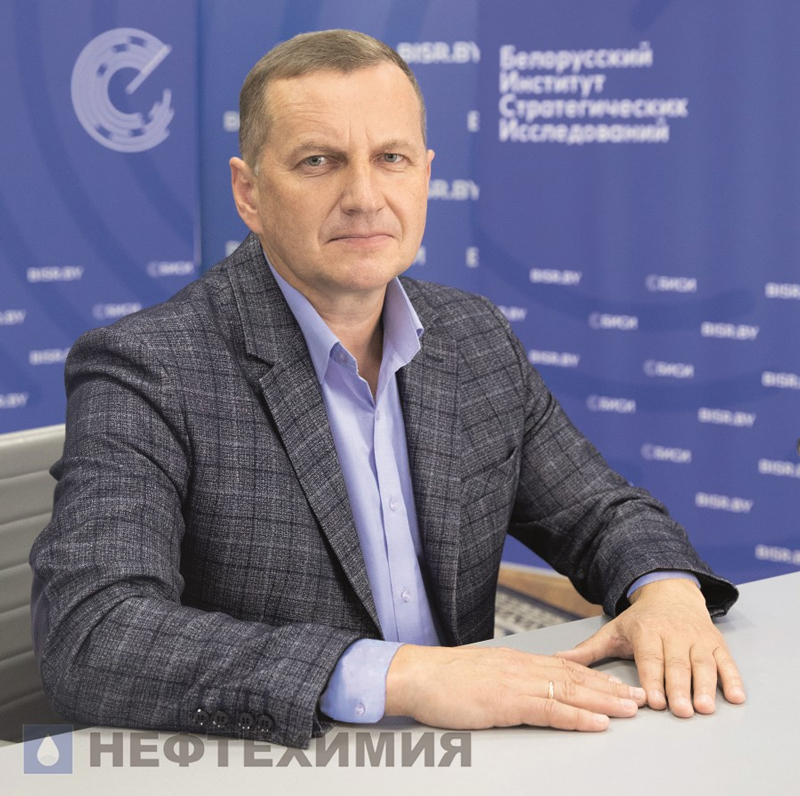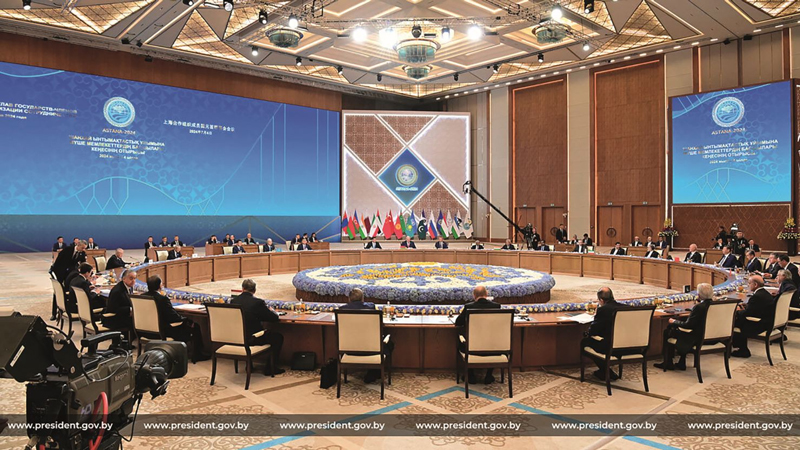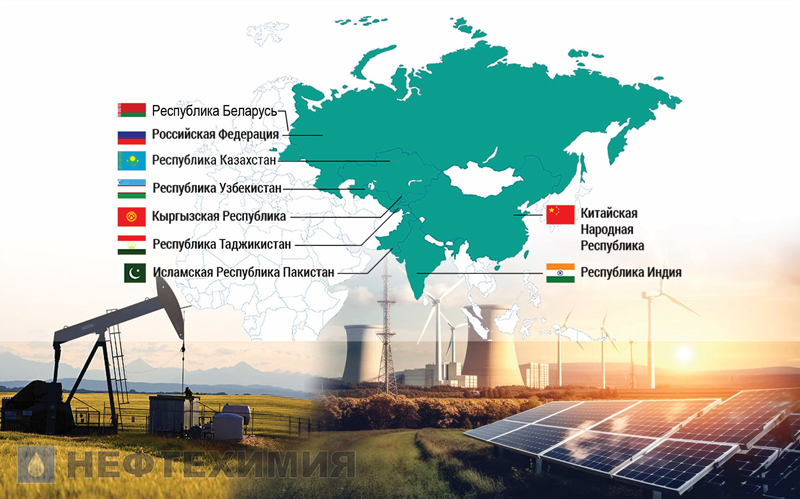Having methodically and responsibly passed almost 15 years, Belarus has become the tenth member of the SCO (along with India, Iran, Kazakhstan, China, Kyrgyzstan, Pakistan, Russia, Tajikistan and Uzbekistan). In 2023, the member states accounted for 70.4% of the total trade turnover of Belarus, and by the end of January-April 2024 – 71.4%.

The SCO countries account for about 40% of the world's population and about a third of the world's economic potential. The organization demonstrates high growth rates - from 4% to 9% of GDP, foreign trade exceeds $8 trillion, which is equivalent to a quarter of all world trade. It is noteworthy that Belarus has become the first purely European member country of the organization.
For reference. The SCO is a permanent international organization established in Shanghai on June 15, 2001 by Kazakhstan, China, Kyrgyzstan, the Russian Federation and Tajikistan. The foundation for uniting countries with different political systems, traditions and values within the SCO became the security sector, as well as trade and economy. The common goal is to ensure a favorable international environment based on the "Shanghai spirit" principles, the main content of which is proclaimed mutual trust and benefit, equality, mutual consultations, respect for the diversity of cultures and civilizations, and the desire for joint development. The founding document is the SCO Charter, signed in June 2002.
A PRAGMATIC CHOICE
Obviously, the world will not return to its former "normality". The point of no return has been passed. That is why Belarus, with the support of Russia and China, its strategic allies and partners, is increasing cooperation with new centers of power in the Global South and East, in particular with the SCO and BRICS.
Following the results of recent opinion polls, more than 65% of respondents consider cooperation with the SCO to be the most in line with the long-term interests of our state.
This approach clearly reflects the adaptation of Belarus' foreign policy priorities and foreign economic interests to the current geopolitical realities. Its outline harmoniously fits the task set by President Alexander Lukashenko – to actively occupy new niches in Africa, Latin America and Asian countries.
Belarus, being an ally of the SCO in building mutually beneficial and equal international relations, welcomes the open constructive nature of the organization, shares its philosophy and demonstrates its willingness to actively engage in all sectors of cooperation.
Our membership in the SCO is not just a desire to follow a fashion trend. It is a consistent civilizational choice in favor of a progressive world majority with an ambitious growing Global South and East at the forefront.
The SCO and BRICS are our asymmetric and adequate response to the illegitimate sanctions pressure of the West.
Given the geography and existing potential, our country is capable and will be able to qualitatively strengthen the SCO, contributing to stability, peace and prosperity in its space.

A PROACTIVE DONOR
Belarus offers not only its own opportunities, but also specific in-demand projects, initiatives and ideas. The official Minsk initially acted and continues to act as a proactive donor.
The initiatives announced by the President of Belarus at the SCO summits in New Delhi and Astana reflect the entire agenda of the organization in a concentrated and comprehensive manner. In fact, we have generated a miniature prototype of the SCO development roadmap for the near future.
Joining this international organization opens up new opportunities in economy, trade, investment, support for international food security, implementation of high-tech projects, finance, logistics, including the active development of alternative transport and logistics routes in Greater Eurasia. Minsk is ready to engage substantively to the efforts to increase mutual settlements in national currencies and create common payment instruments.
Having consistently promoted the idea of "integration of integrations" for a long time, our state advocates the pairing the SCO and BRICS formats with the EAEU and the CIS in a broad context. Most of the SCO Member States are in all these blocs simultaneously. Therefore, the synergy of their potentials can multiply strengthen the Eurasian continent.
The initiative of the President of Belarus to hold a joint summit of the EAEU, SCO and BRICS absolutely fits into this context.
Belarus is a traditional donor of food security. We have been and remain one of the main producers and suppliers of potash fertilizers in the world. We have developed agricultural engineering. Last year, food exports made about $8 billion Food and agricultural products are, by and large, our oil. In this regard, we say that we need the Development Bank and the SCO Development Fund, as well as financial mechanisms protected from external influence.
Belarus is interested in "stitching" the SCO transport space, including through the promotion of such projects as the New Eurasian Land Bridge, the Belt and Road initiative, the North-South and East-West transport corridors. It is important as much as possible to expedite the passage of goods through introducing a digital integrated management system. Trade cannot do without logistics and finance, which today are the Achilles' heel given the illegitimate Western sanctions.
The capacity and solvency of the markets of the Member States makes the SCO a promising space in terms of solving the issue of diversification and outstripping export growth in the face of illegitimate sanctions. In this regard, we welcome China's intention to expand access to its large-scale market and bring trade turnover with the Member States of the organization to $3 trillion.
Yes, the economic track is still behind the dynamics in the security sector due to the lack of mechanisms of financial support for projects. However, more than 60% of the citizens surveyed by our sociologists believe that it is in the sphere of economy, trade and finance that Belarus should actively cooperate with the SCO. Almost 70% see the opportunity to sell their products there in the conditions of closing Western markets. More than 30% of citizens see the SCO as a source of investment, technology and loans.
That is why it is important to build more flexible models of trade and economic cooperation aimed at maintaining positive dynamics and building capacity. The Action Plan for the implementation of the SCO Economic Development Strategy for the period up to 2030, adopted at the Astana summit, meets this key goal.
The SCO 2024 summit as a whole was marked by a curious tendency to shift the emphasis in favor of the economy with the growth of Chinese activity. Of the 25 signed documents on cooperation in the economic sphere, six relate to it. In addition to the final declaration, decisions on the SCO Development Strategy until 2035, on the Association of Investors of the member states, as well as on financial support mechanisms for project activities should be noted.

BENEFITS
In the context of the Belneftekhim concern competencies, the decision to approve the Strategy for the Development of Energy Cooperation between the SCO states until 2030 deserves attention. The document addresses the increase in the level of energy security and technological sovereignty of the member countries, developing dialogue and information exchange in key sectors of the industry, including the electric power industry, oil and gas industry, nuclear energy, as well as building the potential of scientific, technical and personnel cooperation.
In addition, the Strategy implies the development of transit potential, consideration of the possibility of diversifying export routes, and assistance in improving the safety and reliability of the oil and gas transportation infrastructure. It is also planned to study joint projects for making products based on hydrocarbons, including petrochemistry.
Eeconomic development requires a safe environment. The SCO was initially established in 2001 as a structure for border management and ensuring regional security in the Central Asia. Therefore, issues of genuine and indivisible security are among the basic priorities.
In this context, experts quite logically conclude that the SCO states – China, India, Turkey, Iran - prevail in the list of countries that can eventually launch the negotiation process on Ukraine between Moscow and Washington.
Belarus is an important part of security system of Greater Eurasia, and the SCO is its supporting framework, including through the mechanisms of the Union State and the CSTO. Being the western frontier of this zone, we cannot be outside the matrix. Membership in the SCO will help to further strengthen our security, both political and strategic. And our partner countries can benefit from our methods of combating terrorism and extremism. A good example is the joint anti-terrorist exercise of Belarus and the People's Republic of China "Attacking Falcon".
According to BISR opinion polls, about 30% of respondents see the SCO as a potential for increasing the country's defense capability, as well as an additional foreign policy foothold in the face of Western sanctions.
The SCO is not only about security, economy and trade, but also the mutual enrichment of cultures, which stimulates the rapprochement of our peoples. Projects are driven by specific people. And this requires more communication in order to get to know and understand each other better within the framework of intercultural communication, to become stronger and more united.
On the cultural and humanitarian track, we propose to launch the SCO Cultural Festival (in the image and likeness of the "Slavic Bazaar in Vitebsk"), to hold it traditionally on a rotational basis. The idea of creating the SCO Youth Platform is interesting, because all promising projects will be implemented by young people aged 20-30 today. This is our future. A Chinese philosopher Confucius said very precisely on this point, "If your plan is for one year plant rice. If your plan is for a decade, plant trees. If your plan is for one hundred years, educate the children"
This Chinese philosophy fully fits into the call of the President of Belarus for partners to actively engage in the development and coordination of the Eurasian Charter of Diversity and Multipolarity in the 21st Century — another our important initiative. One thing is clear: the SCO space is definitely not a place for conflicts and wars!
EXPERT MEASUREMENT
Time requires that the SCO, positioning itself as a new type of organization, not only to adapt to a changing world, but also to be able to look beyond the horizon of current trends in global and own development. That's why new unifying ideas and meanings are needed. Expert diplomacy, or, as it is called, the diplomacy of the second track, plays an invaluable role here.
Amid the escalation of the geopolitical situation and the erosion of the foundations of international law, sound expert and analytical support for the SCO's activities is especially important and necessary. Practice-based interaction through expert and analytical centers contributes to strengthening the institutional foundation of the SCO, helps to increase the level of mutual trust and mutual understanding, as well as contribute to the formation of a common market of ideas and an image of the future of the organization.
For Belarus, this humanitarian communication channel is an additional opportunity for harmonious integration into the multinational family of the SCO.
The Belarusian Institute of Strategic Research, as a leading state research center founded by the President of the Republic of Belarus, acts precisely in line with such a paradigm.
Definitely, the SCO today is very different from the Shanghai Five, established at the dawn of the 21st century. The world is undergoing complex and profound changes, increasing instability and uncertainty. Against this backdrop, the SCO is facing serious challenges. However, being optimistic, I see hidden opportunities for sustainable development and a positive image of the future in this.
Further update of the organization in order to effectively respond to new challenges and adapt it to modern realities seems necessary. It is important to complete the SCO's institutional and managerial reform, calibrate the mechanisms of practical interaction and implementation of existing agreements, and find an effective model of trade and economic cooperation. At the same time, it should try to overcome mutual problems and contradictions, avoid protectionism and national selfishness.
In the future, the SCO is seen as one of the key centers of influence and attraction on a global scale. The fact that about 20 countries wish to join the organization creates good conditions and inspires optimism. The potential of the Eurasian region is huge, and its role is exponentially increasing. This is a huge resource, production and investment base, and consumer market. All this means that there is a lot of painstaking, stressful, but interesting work ahead of us.

